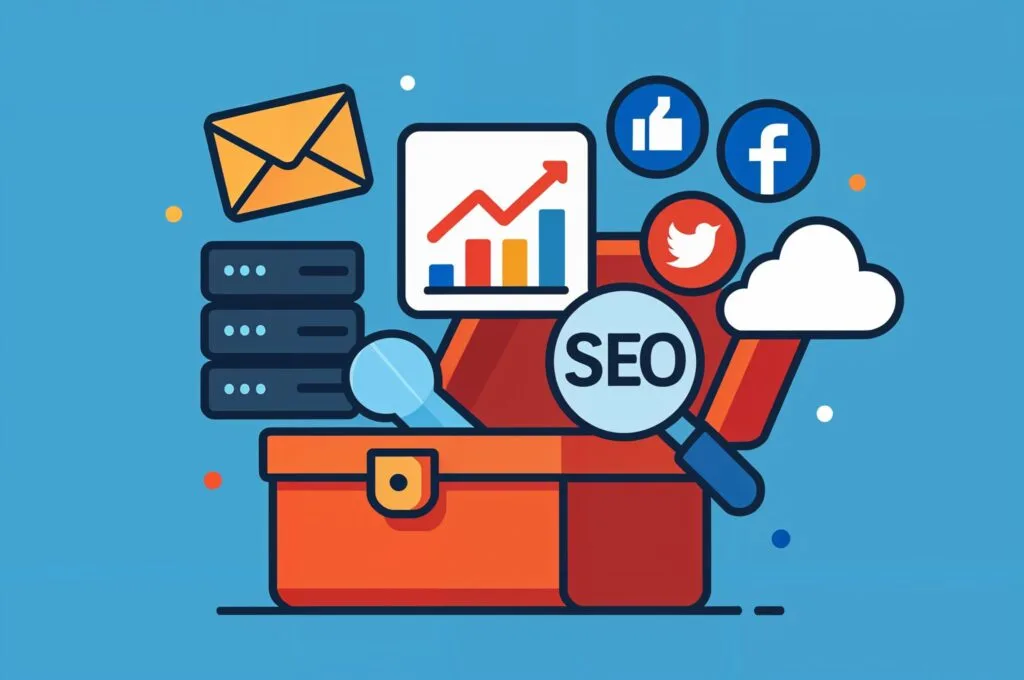
Introduction:
Why You Need the Ultimate Tech Stack for Online Entrepreneurs 2025
If you’re building or scaling an online business in 2025, having the ultimate tech stack for online entrepreneurs 2025 is essential. These days, running a profitable business is about more than just having a great idea. You need the right mix of tools to automate tasks, reach your audience, and optimize your workflows. Thankfully, the right tech stack can save time, cut costs, and help you grow faster than ever. In this guide, we’ll break down exactly what should be in your ultimate tech stack for online entrepreneurs 2025 and how each tool can elevate your business operations.
Build a Strong Website Foundation for Your Entrepreneur Tech Setup
the heart of the ultimate tech stack for online entrepreneurs 2025 is your website and hosting setup. Your website is your digital storefront. Therefore, it should load quickly, stay secure, and handle traffic spikes effortlessly. For hosting, many entrepreneurs prefer options like Hostinger or Bluehost because they’re reliable yet budget-friendly. These platforms offer one-click WordPress installs, free SSL certificates, and 24/7 support. Additionally, tools like WordPress or Webflow allow you to design a beautiful, responsive website without needing to code. Combined with a fast host, your website becomes a powerful tool for lead generation and sales.
Email Marketing & CRM: Automate with a Powerful Digital Business Stack
No tech stack is complete without a solid email marketing solution. Email still delivers one of the highest ROI figures for online businesses. For the ultimate tech stack for online entrepreneurs 2025, consider tools like ConvertKit, Mailchimp, or Systeme.io. ConvertKit is perfect for creators building an engaged list. On the other hand, Systeme.io doubles as an all-in-one platform with funnels and automation. These tools help you segment your audience, send personalized content, and automate follow-ups. As a result, you nurture leads on autopilot while you focus on your core business.
Funnels & Landing Pages: Essentials in a Winning Entrepreneur Tech Toolkit
Your funnels are where the magic happens. To build effective sales funnels, tools like ClickFunnels, Systeme.io, or Kartra are go-to choices. Each one is beginner-friendly yet powerful enough for advanced marketers. They let you craft landing pages, upsells, downsells, and checkouts seamlessly. More importantly, they integrate with your email platform and payment gateways. If your ultimate tech stack for online entrepreneurs 2025 doesn’t include a reliable funnel builder, you risk losing potential revenue. Funnels guide your visitors toward taking action, so choose wisely!
Use SEO & Analytics to Strengthen Your Business Tools
Next, no entrepreneur should ignore SEO and analytics. To understand what’s working, you need clear data. Tools like Google Analytics, Ahrefs, or Semrush are invaluable. They help you find profitable keywords, track your rankings, and spy on competitors. Ubersuggest is another budget-friendly option for keyword research. Pair these with on-page SEO plugins like Yoast SEO if you use WordPress. Don’t skimp on analytics. Knowing your numbers means you can optimize your content, drive more traffic, and make smarter marketing moves.
Content & Design: Key Creative Tools for Online Entrepreneurs
To stand out online, your content must shine. Thankfully, amazing tools exist for content creation. For visuals, Canva Pro and Adobe Express lead the pack. Canva Pro is intuitive and packed with templates for social posts, ads, and presentations. Adobe Express offers extra design power for more advanced edits. For writing, AI tools like ChatGPT or Jasper AI can help generate blog outlines, social captions, and sales copy quickly. Including these tools in your workflow ensures you produce high-quality content consistently without wasting hours.
Payment Gateways: Secure Payment Solutions in Your Digital Tech Stack
You can’t run a business without collecting payments. Therefore, reliable payment gateways are crucial. Popular options include PayPal, Stripe, and Razorpay. PayPal is trusted worldwide, Stripe offers seamless integrations for subscription billing, and Razorpay is excellent for Indian businesses. Choose a payment processor that suits your target market and business model. The goal is to make transactions smooth for customers while keeping your funds secure.
Smart Extensions & Productivity Add-Ons for Entrepreneurs
Finally, smart entrepreneurs stack their tech with time-saving browser extensions. Tools like Grammarly, Loom, and StayFocusd boost your daily efficiency. Grammarly ensures your communication stays professional. Loom makes it easy to record quick explainer videos. StayFocusd blocks distracting sites so you get more done. Combined, these productivity tools make the ultimate tech stack for online entrepreneurs 2025 even more powerful.
 Final Thoughts: Build Your Ultimate Tech Stack for Online Entrepreneurs 2025
Final Thoughts: Build Your Ultimate Tech Stack for Online Entrepreneurs 2025
Your ultimate tech stack for online entrepreneurs 2025 should be tailored to your business goals. However, the right mix of website hosting, funnels, email automation, SEO, payment gateways, content tools, and productivity extensions can transform your business. As you grow, revisit your stack and upgrade where needed. The best tech stack works quietly in the background—saving you time, automating tasks, and driving growth every day.
Ready to level up your business? Start building your ultimate tech stack for online entrepreneurs 2025 today and watch your online venture thrive this year and beyond.
 Final Thoughts: Build Your Ultimate Tech Stack for Online Entrepreneurs 2025
Final Thoughts: Build Your Ultimate Tech Stack for Online Entrepreneurs 2025